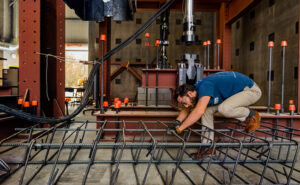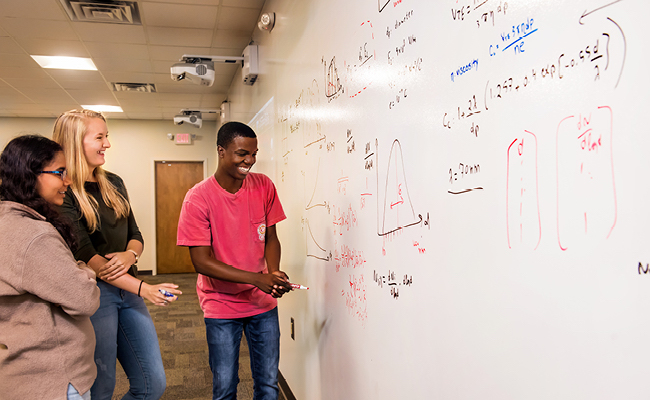 Just five years after being founded, UGA’s College of Engineering is already fulfilling its promise to Georgia. Created to fill the needs of this rapidly growing state, the university’s College of Engineering is showing growth in all areas— including enrollment, research, placement, and corporate partnerships—and is poised to reach even greater heights by the end of its first decade.
Just five years after being founded, UGA’s College of Engineering is already fulfilling its promise to Georgia. Created to fill the needs of this rapidly growing state, the university’s College of Engineering is showing growth in all areas— including enrollment, research, placement, and corporate partnerships—and is poised to reach even greater heights by the end of its first decade.
“Judging by all metrics associated with the college, we’re growing,” says Dean Donald Leo. “We’re really serving the purpose of why the college was formed.”
Engineering is one of UGA’s oldest academic subjects, with classes offered as early as 1844 and the first engineering graduates receiving their diplomas in 1868. Focused on civil engineering first and later agricultural engineering, the program was moved to what is now the College of Agricultural and Environmental Sciences. But progress was interrupted by the Great Depression. It wasn’t until 1993—when biological engineering was added—that the program began to grow again.
“There was a recognition that giving students more options to study engineering was important for the state of Georgia,” Leo says. “Today there are 50 percent more students across the state studying engineering than there were 10 years ago. I think it’s a healthy ecosystem for the state to have multiple engineering programs that serve students and families throughout Georgia.”

UGA’s program is serving Georgia residents; 93 percent of engineering undergraduate students are from this state. And the overall number of students has tripled in recent years. In 2011, enrollment in engineering programs totaled a little more than 600 students. Last fall, there were nearly 2,000 students, and engineering has become a high-demand major—students must apply to enter the college.
The addition of biochemical, environmental, and computer systems engineering in 2005 and civil, electrical/electronics, and mechanical engineering in 2010 have broadened options for students and expanded the college’s reach.
“That’s a multiplier on the impact that we have on the state and in the region and in the nation,” Leo says. “The breadth of programs is going to connect into a broader array of industries.”
An increasing number of corporate partners are demonstrating their support for the College of Engineering. The partnership program, only a year old, has attracted 20-plus companies—including AT&T, GE, and Lockheed Martin—that provide financial support to enhance the quality of engineering education. The college’s career and internship night also is attracting more support. Three years ago, 40 employers participated; last fall, there were 100, including Carter Engineering Consultants, a civil engineering and land surveying firm in Watkinsville that is also a corporate partner.
“It was amazing to see how many different employers were there looking for engineering graduates,” says Jeff Carter BSAE ’95, founder and principal engineer. “The college is doing a great job of reaching out to the engineering community.”
To better serve the state of Georgia, UGA’s College of Engineering must graduate students who will not only fill jobs, but excel at them.
The capstone senior design course, taken by each student, offers hands-on opportunities to work on real-world projects with clients all over Georgia, including the Chattahoochee Hills city council and the city of Metter, both repeat clients.
“They’re astounded by the quality of work that the students do,” says Stephan Durham, who co-teaches (with Assistant Professor Jason Christian) the joint capstone course for civil and environmental engineering.
During fall and spring semesters, students in the course tackle a real-world problem and maintain an ongoing dialogue with the client.
“You might have the mayor, you might have members of the city council—everyone that’s involved or has a stake in that project is sitting at the table,” says Durham, associate professor and assistant dean for student success. “The students realize that it takes a lot of different people to make these projects happen. I think for them there’s a realization that engineering is a very collaborative type of profession.”
“The thing that I really took away from that class is not just the engineering aspect of it, but having to prepare a presentation to the client and explain our findings, calculations, and design to them,” says Abby Caballero BSCE ’16. “Sometimes that’s the hardest part.”
To equip students for such situations, Durham and Christian look for opportunities to foster professional development. Through collaborations with UGA’s Archway Partnership and Fanning Institute, the students connect with community administrators and earn leadership certification through the capstone course. They also gain maturity and confidence in their abilities, Durham says.
“I think they quickly learn that not everything is in a book,” he says. “In the real world, as an engineer, you’re going to have to go out and seek answers, seek resources to apply to your design.”
Caballero, who now works for a structural engineering firm in Tucker, agrees.
“When we do our homework problems, you don’t worry about money,” she says. “You can make as much concrete as you want or as big a beam as you want—you just make it work. But when you’re doing a real problem, it has to be feasible.”
Like Caballero, the university’s engineering students are graduating and finding work. The college’s Class of 2016 had a 90 percent placement rate, according to a career outcomes survey conducted by the UGA Career Center.
The availability of well-trained graduates helps the state recruit new businesses and retain existing ones, says Sean McMillan, director of UGA’s economic development office in Atlanta.
“Corporations considering Georgia as a new location are constantly seeking a pipeline of talent,” he says. “The number one question is, ‘Where can I find my workers?’”
“Talented, technically trained engineers are in constant demand. Those skills are not enough. A well-rounded graduate who is flexible, can troubleshoot, and can work well with others is what companies are chasing now.”
The College of Engineering is taking advantage of UGA’s liberal arts environment to better prepare students.
“We recognize that for us to be successful, we need to build on the other great strengths of UGA,” Leo says.
“Science and Consideration,” a course created with researchers in the School of Social Work, introduces students to empathy as a learned skill that improves communication. A new program offered in partnership with the Terry College of Business allows students to earn a bachelor’s degree in engineering and an MBA within five years. And another new program, developed with the Franklin College of Arts and Sciences, offers students a dual degree in German and engineering that includes a year abroad for coursework and an internship with a German company.
Such investments are creating graduates that are in demand in today’s job market, Leo says.
“When companies give us feedback about students they’ve hired, for interns or co-ops or full time, the feedback we get is that our students are very well rounded,” Leo says. “They feel like our students are ones that they can put in front of a client immediately. They understand how to communicate, how to work in teams.”
Carter Engineering Consultants has had an internship program since 2004, when the firm was founded. Carter and his fellow principal engineers, Brian Kimsey BSAE ’95 and Mark Campbell BSAE ’02, have hired a number of UGA students as interns, and some of those have become full-time employees after graduation.
“So much of our profession is not just engineering,” he says. “It’s also being able to talk with clients and government entities. We’ve found that the graduates we’ve hired have been able to do that.”
Last year, UGA announced its partnership in a new national public-private consortium to revolutionize the fiber and textiles industry through commercialization of highly functional advanced fibers and textiles for the defense and commercial markets. The partnership, Advanced Functional Fabrics of America (AFFOA), includes leading research universities like the Massachusetts Institute of Technology and Fortune 500 companies like Corning. AFFOA is just one example of the College of Engineering’s thriving research, which has seen a 250 percent increase in funding during the last five years.
With rapid growth in every area, leading the college through the next five years requires thoughtful planning, Leo says.
“We’re at a scale now where we’ve grown quite rapidly, but we do have to realize that many engineering programs are four or five times bigger than us in terms of the number of faculty and students,” he says. “We have to be very strategic in what we want to invest in, and what we want to be good at. Going forward, those investments are going to give us leadership in areas of excellence that we want to be known for.”
One such investment is the Institute for Resilient Infrastructure Systems (IRIS), announced last fall. IRIS will explore ways to strengthen traditional “gray” infrastructure systems (such as water and sewage treatment, urban drainage, energy, and transportation) and integrate them with “green” and “blue” infrastructure (green spaces, bodies of water, and ecosystems) that perform vital functions such as buffering storms and cleansing water and air.
IRIS joins three other institutes—the New Materials Institute, the Engineering Education Transformations Institute, and the Georgia Informatics Institutes for Research and Education—in searching for ideas that can be transformed into solutions for society’s pressing challenges.
This spring, the college restructured into three academic units: the School of Electrical and Computer Engineering; the School of Chemical, Materials and Biomedical Engineering; and the School of Environmental, Civil, Agricultural and Mechanical Engineering.
While growth necessitates some changes in infrastructure, Leo wants to make sure that the college retains its identity while preparing students to join Georgia’s workforce.
“Leadership, communication, teamwork—those have really been a hallmark of this program since back in the day when [the focus] was agricultural engineering,” Leo says. “The opportunity and challenge that we have now is continuing that tradition now that we have 2,000 students instead of 200.”


